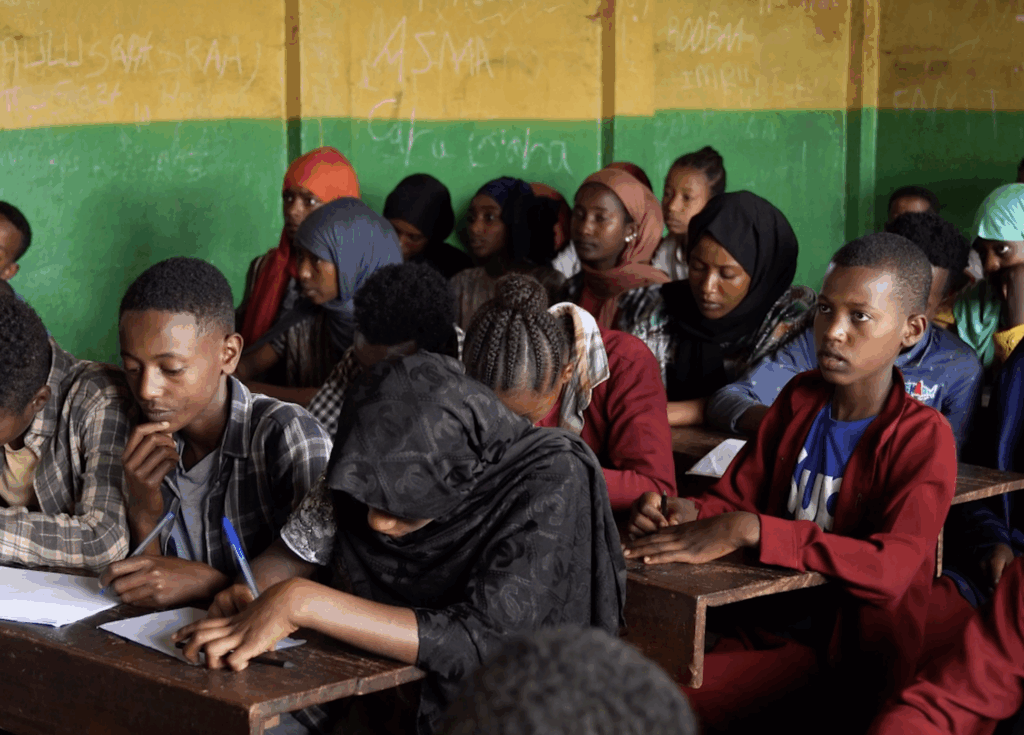In rural Ethiopia, getting a quality education can be very challenging. Classrooms are often packed, books and supplies are in short supply, and schools lack sanitation facilities. For many children, and especially girls, learning in these conditions is a daily struggle. Cordaid’s Performance-Based Financing approach demonstrates that change is possible.

Long distances to school, household chores, early marriage, and the lack of menstrual hygiene facilities have kept many girls from learning. In rural areas, only a few girls reach secondary school, and overall learning levels remain worryingly low.
Against this challenging backdrop, the Performance-Based Financing (PBF) Education Pilot in Shabe Sombo Woreda, in Jimma Zone in the west of the country, is demonstrating what happens when accountability meets opportunity. Implemented across 54 primary schools with Cordaid’s support, the pilot links school funding to verified results, rewarding tangible improvements in teaching quality, management, and community engagement.
Visible Gains in Quality and Governance
The mid-term review of the pilot tells a compelling story of transformation. Within a short period, education quality scores have surged from 29% to 77%, outperforming comparison areas. Despite national declines in exam pass rates, Shabe Sombo’s Grade 8 results remained strong at 87%, showing that schools are sustaining performance even in a complex national context.
Governance and accountability have strengthened dramatically. The woreda education office now conducts regular inspections and financial audits, ensuring transparent budget management. Schools are taking ownership of their performance, setting priorities, analysing data, and investing directly in what matters most to learners. This data-driven approach has replaced guesswork with planning, creating a new culture of self-assessment and continuous improvement.
Watch this documentary to see how these efforts are transforming schools and communities:
A Lifeline for Girls’ Education
Through the PBF approach, schools have channelled part of their performance-linked funds into improving sanitation, providing clean drinking water, and establishing menstrual hygiene corners.
These targeted investments have helped reduce absenteeism among girls and created safer, more inclusive learning environments. Counselling services offer emotional and social support, ensuring girls have both the confidence and resources to stay in school.
In communities where girls’ education once seemed a distant dream, parents are now seeing its value. Attendance is rising, and education is increasingly viewed not as a privilege but as a right and a pathway to a better future. Evidence consistently shows that every additional year of education for girls leads to better livelihoods, healthier families, and stronger, more resilient communities.
Driving Systemic Change
The success of the PBF model extends far beyond classroom walls. It is transforming how local education systems function, shifting from a reliance on external aid to proactive, performance-based management.
Schools now set their own targets, track progress, and are rewarded for verified achievements. Ownership has grown across all levels, from teachers to local education authorities and parent associations. Transparent performance monitoring ensures that resources reach those who need them most, building trust between schools, communities, and government offices.
Through the project, schools have improved infrastructure, including proper toilets, clean drinking water, and adequate seating and learning materials. Teachers have become more motivated, and school leaders have developed stronger management skills. The result is not just better schooling, but a stronger sense of pride, ownership, and innovation.
